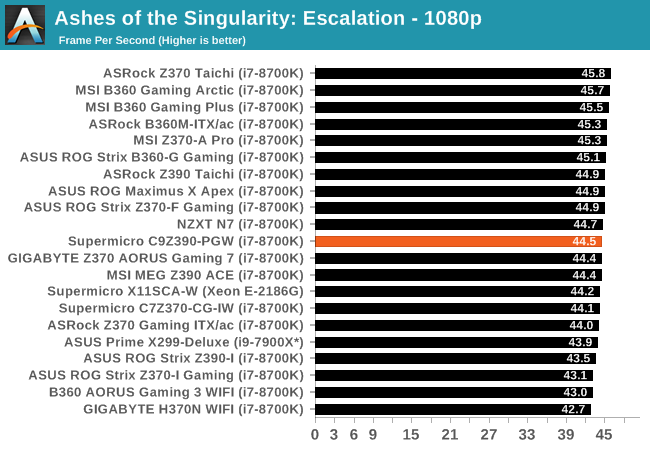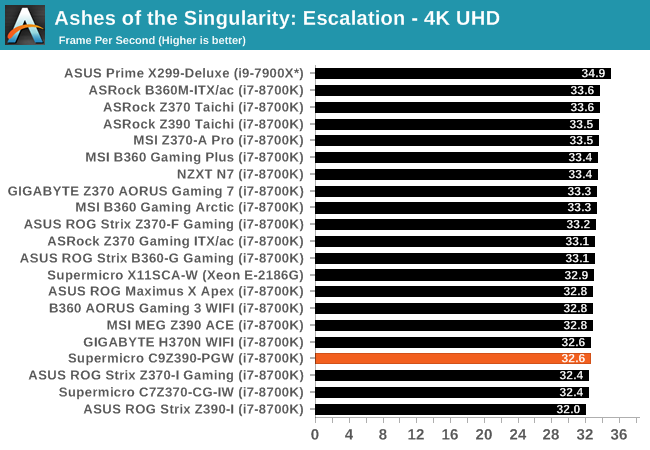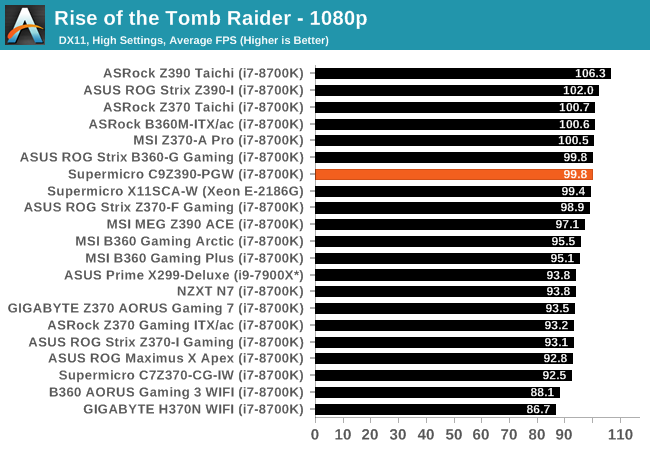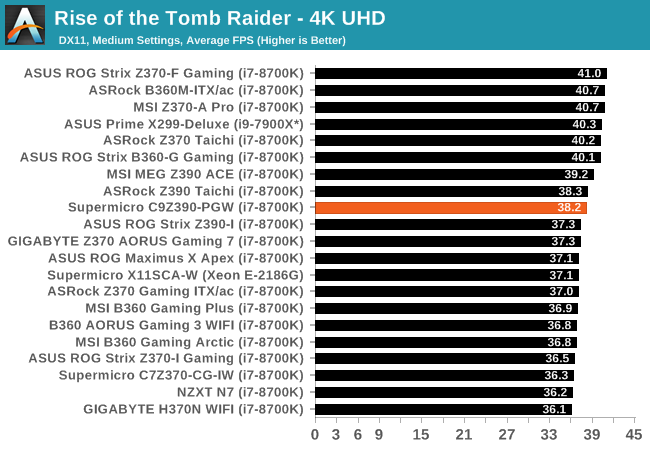The Supermicro C9Z390-PGW Motherboard Review: The Z390 Board With PLX and 10GbE
by Gavin Bonshor on February 1, 2019 9:00 AM EST- Posted in
- Motherboards
- Intel
- Broadcom
- Supermicro
- ATX
- PLX
- PLX8747
- Supero
- Z390
- C9Z390-PGW
- PEX8747
Gaming Performance
AoTS Escalation
Ashes of the Singularity is a Real-Time Strategy game developed by Oxide Games and Stardock Entertainment. The original AoTS was released back in March of 2016 while the standalone expansion pack, Escalation, was released in November of 2016 adding more structures, maps, and units. We use this specific benchmark as it relies on both a good GPU as well as on the CPU in order to get the most frames per second. This balance is able to better display any systematic differences in gaming as opposed to a more GPU heavy title where the CPU and system don't matter quite as much. We use the default "Crazy" in-game settings using the DX11 rendering path in both 1080p and 4K UHD resolutions. The benchmark is run four times and the results averaged then plugged into the graph.



Rise of the Tomb Raider
Rise of the Tomb Raider is a third-person action-adventure game that features similar gameplay found in 2013's Tomb Raider. Players control Lara Croft through various environments, battling enemies, and completing puzzle platforming sections, while using improvised weapons and gadgets in order to progress through the story.
One of the unique aspects of this benchmark is that it’s actually the average of 3 sub-benchmarks that fly through different environments, which keeps the benchmark from being too weighted towards a GPU’s performance characteristics under any one scene.













42 Comments
View All Comments
shabby - Friday, February 1, 2019 - link
Play harder? These guys need some new marketing people.crotach - Friday, February 1, 2019 - link
They could include a sticker in the box that says "My other motherboard is an Asus"prophet001 - Friday, February 1, 2019 - link
Seems like Asus' quality has gone down in recent years?GTVic - Friday, February 1, 2019 - link
I base my buying decisions exclusively on online comments like this.close - Tuesday, February 5, 2019 - link
Your alternative is to buy a significant number of boards (hundreds and up) and use them over a significant period (years) in order to have any hope of a reliability statistic based on a remotely relevant data set. Are you? Because otherwise when it comes to "quality" I agree, you DO base your buying decisions exclusively on online comments like this.GreenReaper - Friday, February 1, 2019 - link
Well that's why you got a Supermicro.philehidiot - Saturday, February 2, 2019 - link
Just out of interest, banter aside, I've been an incidental fan of Asus mobos for many decades in that, whilst I consider all the major brands, I always seem to end up with an Asus. It's not intentional, it's just perhaps that their selection of feature sets to market perhaps always seems to meet my needs. I've never had an Asus fail on me it must be said, (aside from an incident stemming purely from my own cackhandedness around a CPU socket) I've never had an issue and they've always seemed well built. My last Asus board was bought around 5-6 years ago and was just the same as the rest in terms of build. Is the general consensus that Asus's build quality has dropped and they should be treated with caution?jabber - Sunday, February 3, 2019 - link
I've had plenty of Asus and they have all been fine. I've got a X99 Asus at the moment and its been pretty solid. To be honest I've not seen a failed motherboard since the removal of electrolytic caps around 2006. I remember around 2009-2011 I was getting masses of PCs in from 2003/2006 with 'issues' and as soon as I opened them up I would see the crusty bulging caps.Boards have physically improved all round I would say. Now if they could get the bugs out of the BIOS...
Gadgety - Monday, February 4, 2019 - link
Yes, bugs, pathetic. PC industry is supposedly competitive, yet so many present half baked solutions, and lots of marketing talk. ASUS charges extra premium and still doesn't deliver a bug free BIOS.close - Tuesday, February 5, 2019 - link
I have a ROG board that stopped receiving driver and BIOS updates less than 2 years after launch. This wouldn't matter much if the existing drivers worked properly under Win10 and offered all the functionality advertised in big letters on the box. It didn't. I simply take that as a lesson to stay away from the praised high end. At least when they inevitably sh*t the pants I will not be too disappointed.But yes, it's still working although with just the occasional reset in memory parameters where it defaults to the lowest memory frequency. And some other small annoyances with the drive order. Etc. Great job they did on that BIOS.